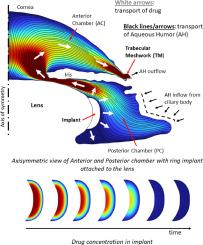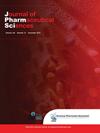眼内透镜环形植入物的药物输送:模拟研究
IF 3.7
3区 医学
Q2 CHEMISTRY, MEDICINAL
引用次数: 0
摘要
眼部植入物的设计需要多次反复,才能达到预期的几个月甚至几年的使用期限,因此有必要使用用于眼部给药的室内模型。在这项研究中,我们开发了一个硅内模型来模拟水液(AH)的流动以及药物从植入体到小梁网状结构(TM)的输送。植入体连接到眼内晶状体(IOL)的一侧,而小梁网被视为多孔介质,它们对 AH 流的影响通过达西方程来计算。根据文献报道,该模型能准确预测健康人和青光眼患者的眼压(IOP)生理值。结果显示,药物在植入体内的有效扩散率是关键参数,可改变生物利用度时间段(BTP),从几天到几个月不等。从直观上看,随着有效扩散率的降低,生物利用时间应该会延长。然而,我们发现,在初始药物负载水平较低的情况下,当有效扩散率低于特定阈值时,生物利用度时间段就会缩短。我们的研究结果进一步表明,虽然 AH 流量对植入部位的药物释放曲线影响甚微,但却对 TM 的药物可用性产生了重大影响。本文章由计算机程序翻译,如有差异,请以英文原文为准。

Drug delivery from a ring implant attached to intraocular lens: An in-silico investigation
Multiple iterations required to design ocular implants, which will last for the desired operational period of months or even years, necessitate the use of in-silico models for ocular drug delivery. In this study, we developed an in-silico model to simulate the flow of Aqueous Humor (AH) and drug delivery from an implant to the Trabecular Meshwork (TM). The implant, attached to the side of the intraocular lens (IOL), and the TM are treated as porous media, with their effects on AH flow accounted for using the Darcy equation. This model accurately predicts the physiological values of Intraocular Pressure (IOP) for both healthy individuals and glaucoma patients, as reported in the literature. Results reveal that the effective diffusivity of the drug within the implant is the critical parameter that can alter the bioavailability time period (BTP) from a few days to months. Intuitively, BTP should increase as effective diffusivity decreases. However, we discovered that with lower levels of initial drug loading, BTP declines when effective diffusivity falls below a specific threshold. Our findings further reveal that, while AH flow has a minimal effect on the drug release profile at the implant site, it significantly impacts drug availability at the TM.
求助全文
通过发布文献求助,成功后即可免费获取论文全文。
去求助
来源期刊
CiteScore
7.30
自引率
13.20%
发文量
367
审稿时长
33 days
期刊介绍:
The Journal of Pharmaceutical Sciences will publish original research papers, original research notes, invited topical reviews (including Minireviews), and editorial commentary and news. The area of focus shall be concepts in basic pharmaceutical science and such topics as chemical processing of pharmaceuticals, including crystallization, lyophilization, chemical stability of drugs, pharmacokinetics, biopharmaceutics, pharmacodynamics, pro-drug developments, metabolic disposition of bioactive agents, dosage form design, protein-peptide chemistry and biotechnology specifically as these relate to pharmaceutical technology, and targeted drug delivery.

 求助内容:
求助内容: 应助结果提醒方式:
应助结果提醒方式:


